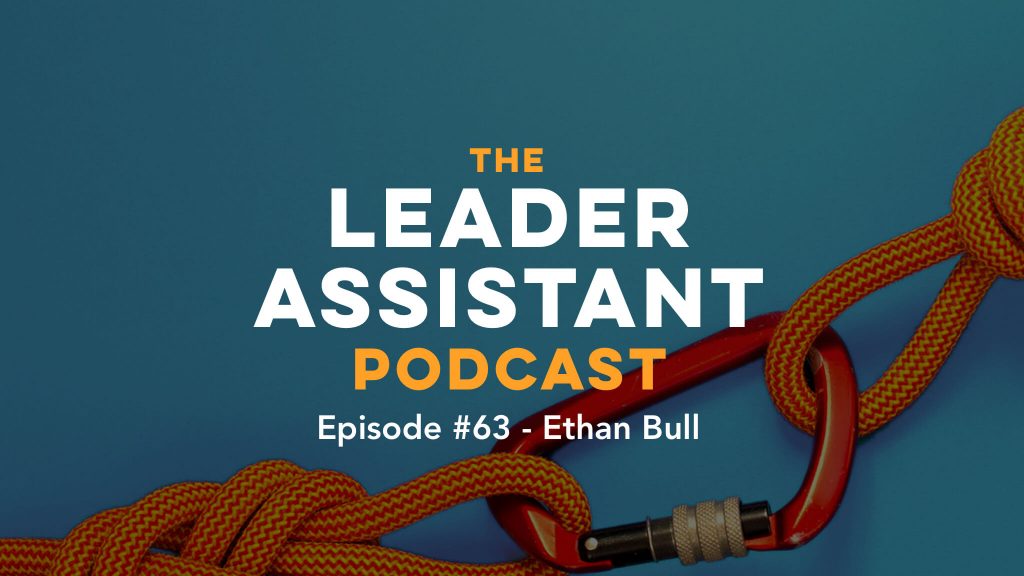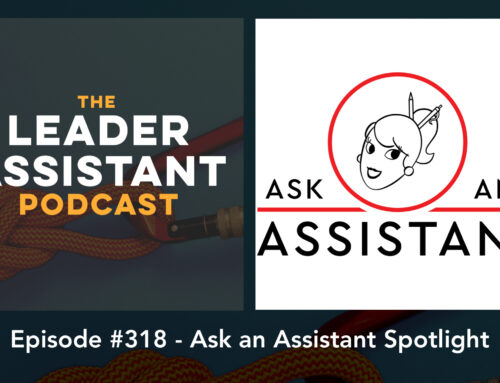Ethan Bull is a longtime Executive Assistant and CoFounder of ProAssisting, a remote EA firm in the U.S. He has great advice for working remotely, managing multiple executives, and more.

Ethan and I talk about how their remote EA company, ProAssisting, is different from many of the other VA firms. We also talk about tips for hiring and interviewing, and he shares a crazy story from his time in the film industry.
Be sure to check out this compensation and state of the assistant report that Ethan and his team at ProAssisting put together, and learn more about opportunities to join their remote team here.
LEADER ASSISTANT MEMBERSHIP
Check out our new Leader Assistant Membership for ongoing training, coaching, and community.
LEADERSHIP QUOTE
I’ve learned that people will forget what you said, people will forget what you did, but people will never forget how you made them feel.
-Maya Angelou
CONNECT WITH ETHAN
ABOUT ETHAN
Ethan has worked as an assistant for over 25 years. He got started in entertainment, transitioned to advertising, and then to healthcare. Through this experience he and his wife, Stephanie Bull, created ProAssisting, a remote executive assistance company.
THE LEADER ASSISTANT BOOK
Download the first 3 chapters of The Leader Assistant: Four Pillars of Game-Changing Assistant for FREE here.
SUBSCRIBE
Subscribe to The Leader Assistant Podcast so you don’t miss new episodes!
You can find the show on Apple Podcasts, Spotify, Google Podcasts, Pandora, and Stitcher.
Join my email list here if you want to get an email when a new episode goes live.
JOIN THE COMMUNITY
Join the Leader Assistant Slack Community here, or the Facebook Group here for bonus content and to network with other assistants who are committed to becoming leaders!
LEAVE A REVIEW
If you’re enjoying the podcast, please take 2 minutes to rate and review the show on Apple Podcasts here. Each review helps me stay motivated to keep the show going!
—
EPISODE TRANSCRIPT
Ethan Bull 0:00
My name is Ethan Bull and today’s quote is from Maya Angelou. And she said, I’ve learned that people will forget what you said, people will forget what you did, but people will never forget how you made them feel.
Podcast Intro 0:15
The Leader Assistant Podcast exists to encourage and challenge assistants to become confident game changing leader assistants
Jeremy Burrows 0:28
Welcome to Episode 63. Hey, everyone, thanks for listening to The Leader Assistant Podcast. Today I’m speaking with Ethan Bull. He’s the co founder of Pro Assisting. And I’m very excited to speak with him about remote EAS and virtual work. And yeah, it should be good episode. But I wanted to encourage you to check out their website proassisting.com. They have a compensation report called the state of the assistant 2020. That’s got some valuable information as you try to distinguish what tier you fall in, in your role, and maybe even a little bit of titling information on that as well. As far as compensation and tiling goes, it’s a good resource to check out proassisting.com. Also, you can of course, check out the show notes at leaderassistant.com/63 to get a link directly to that report. And yeah, I hope you enjoy this conversation with Ethan. Actually, before I jump into the conversation, I wanted to let you know about our new leader assistant membership. It is $39 A month or $399 a year which is like 33 a month or something like that. And we do one group coaching training webinars session every month. And you get access to the recordings of all of the sessions even if you can’t make them live. So you get access to the member resource library, which includes recordings from all of the sessions with the Q and A’s in the training. And then also some bonus material and resources. So if you’re interested in joining us, it’s been a great group so far. Again, it’s just a way to get consistent professional development at an affordable price and with some other top EAS who are all about learning and developing themselves, and really being leaders that the world needs. So you can check us out at members.leaderassistant.com That’s members.leaderassistant.com to check out the leader assistant membership. Hey everyone, thanks for tuning in to The Leader Assistant Podcast. It’s your host Jeremy Burrows and today I’m talking with Ethan Bull who is co founder of pro assisting a remote executive assistant firm. Hey, Ethan, how are we doing?
Ethan Bull 3:02
Really Well, Jeremy, thanks for having me on.
Jeremy Burrows 3:05
And what part of the world are you in?
Ethan Bull 3:07
I’m right outside of Rochester, New York and upstate New York.
Jeremy Burrows 3:10
Nice, nice. What was your very first job? And what skills did you learn in that role that you still use today?
Ethan Bull 3:19
I actually worked for my father in our family restaurant when I started when I was in like really sixth grade just bussing tables without getting paid. And then when I finally turned I think it was 14 or 15. I got my work permit and I could I could start bussing tables. So bussing tables was my first job. But growing up in a family restaurant working for your father brings in a couple of different things, if you will. I I really had a strong work ethic instilled in me early on, by really wanting to perform well for my father. And on top of that, working in a restaurant, I didn’t really realize it at the time. But I was learning a lot about service and hospitality that has stuck with me ever since. And we would have the restaurant shopped every year by someone going undercover and coming in. And they would rate everything from how much time it took the hostess to come over and greet them. Did they greet them with a smile? How long did it take the server to get to them once they were first seated? All those little things and we would review those reports once a year. And I think back to that a lot in terms of where my idea of providing excellent service and hospitality comes from and I I didn’t know it at the time but but that was a really awesome foundation.
Jeremy Burrows 4:47
That’s awesome. So when did you kind of how did your career progress and when did you end up becoming an assistant
Ethan Bull 4:58
I went to bed It’ll University in Waltham outside of Boston, it’s kind of a specialty Business School. And when I studied abroad in Australia, I was playing music in a band. And I realized that I kind of wanted to try and marry my creative outlets with business. And so when I got back to Massachusetts, I started working for Warner Brothers Records as an intern, a marketing intern. And through that job, I heard about a production assistant job in New York City working on the movie Addicted to Love. And I decided to take that opportunity. And I did and working as a production assistant is really the low rung of the totem pole in entertainment and making films. And I learned a ton. And that really started me on my path. And from there, I worked other studio and independent productions. And then I worked for the William Morris Agency, in New York City, in the mailroom, pushing a mail cart in their agent Trainee program. And that’s really where you, you know, you get exposed to working for agents, their desk as their assistant. And that is really where I earned my stripes as an assistant, and then decided to progress from there.
Jeremy Burrows 6:26
So how did you kind of work your way up to the more executive assistant role?
Ethan Bull 6:35
Well, from William Morris, I went to USA films, and I was second assistant to the Chairman, there, while we were making the movie traffic that won the Academy Award that year. And it was really high pace. We were working in New York, but working also la hours, West Coast hours as well. So we had the office covered for an extended period of time in the evening. And that, that really solidified my assistant skills from a hard skills standpoint. And after I, after being in that job for a year, I realized that while I love entertainment, and I wanted to, you know, pursue some creative outlets in entertainment, I felt that being an assistant in in advertising was a great way to do that. So I could be an assistant at a big ad firm, where the pressure wasn’t so high, as it was assisting the chairman of a film studio. And I could I could focus my, on my creative outlets outside the office. And so yeah, and then, and then my stint in advertising turned into 15 years. So go figure. And, and I progressed there and took on a number of different roles over the years as it went on.
Jeremy Burrows 8:05
So what made you kind of stick with the role of an EA versus kind of branching off and doing something else?
Ethan Bull 8:13
Well, it’s funny, you asked that, because I was presented that option from one of my bosses, he said, Look, you know, what do you want to do. And he’s like, if you want to just keep being my assistant, and, and progress there, that’s great, we would love that. But if you want to progress and try something else in the company, that would be great, too. And I decided to stick with being an EA one because I was I felt that I was good at it. And I had a great rapport with with my boss, and then my future boss there. And there was a lot of security in in being an executive assistant in the ad world as opposed to being on the account side or the creative side. If you lose an account, a lot of people are let go, who worked on that account. So I was able to to stay there for a long period of time, create my own career path, which we can get into if you like, and again, it gave me the time outside of the office to write and direct, short films. And I published a graphic novel, worked with a number of producers on a couple of different screenplays. So I was doing all of that outside the office, while my day job supported me and I actually, I was pretty good at it. So it worked out well.
Jeremy Burrows 9:34
Nice. So yeah, let’s talk about the career path a little bit. So a lot of there’s been a lot of discussion in the EA world in EA community about, you know, if you get to the point where your EA to the CEO, at you know, maybe a decent sized company, that’s kind of like the ceiling in a lot of corporations. So, you know, there’s there’s the idea of oh, well you can You go via chief of staff and some places, or maybe you go do a director of operations or, but there’s kind of this talk about, Okay, what else is what’s next for an EA? Once you’ve been kind of the top of the top, which is EA to the CEO? So how did you kind of navigate that career path? And do you have any thoughts on kind of maybe what’s what’s next for EAS who just love the EA role, but they want to keep growing in responsibilities, and of course, compensation?
Ethan Bull 10:33
Yeah, um, for me, it, it happened gradually, I worked for the chief operating officer for a big 10 ad agency on Madison Avenue. So you know, you’re talking big, big name clients, over a billion in revenue, and multiple offices on multiple coasts. And through that time, what I saw, and working with my boss, who was the chief operating officer was that the human resource department, you know, and I found this in other companies as well, the human resource department, you know, really wants an awesome assistant support staff that come in, do a great job for their, for their principles, and, and have a smile on their face. It’s when you’re dealing with hiring and firing and training and setting expectations, were the human resource departments that I’ve worked in a lot of them focus all that energy on the executives, and, and at that level, and just want the assistant support staff to work. And I get that, I totally get that. But in a few discussions with my boss, she was like, Look, why don’t you take over interviewing, you know, resource management, deciding how many assistants are assisting how many executives, we actually, I ended up overseeing about 12 assistants, and we had a pool of about 60 executives that we supported. And so they’re, you’re talking about a five to one executive to assistant ratio. And in that kind of situation, you you kind of have to put guardrails on what the executives can actually use their assistance for, because if they could use them for anything, and one assistant is assisting five people, they could get in the weeds really quickly. So we put some guidelines in place, and, and, you know, really focused what the role was within the organization. And then, you know, tried to raise that level of expectations, through training, and, you know, talking about what really makes, you know, an exceptional assistant, and how that how that comes together. So, I ended up progressing from administrative assistant to executive assistant to senior executive assistant. And then, the last three years of my time there, I was Director of Administrative Services, while I was also assisting the Chief Operating Officer. So my suggestion for people who are in that top spot and want to look for a little more, you know, you got to look at your organization, and maybe see where there are some deficiencies where you could step up and play a role, and then have that conversation with hopefully, the C suite executive that you’re assisting. And I, I’ve come across quite a few executives. And I’ve seen it happen, where they have a great assistant, and they see another role that they would be great for, and they promote them from within, and it does happen. And it’s about being being open and proactive, from the assistant standpoint to the executive saying, hey, this really interests me. You know, if you you know, if you see something that that might be right for me, that’d be great. And, and I’ve seen that happen before, too.
Jeremy Burrows 14:11
Yeah, that’s great. So you said you kind of ran with finding assistants and even the interview process? So what what should executives look for in an assistant and what did you look for when you’re building out that team?
Ethan Bull 14:27
Um, a lot of it comes down to personality. When I am sitting across from someone, something as simple as the small talk, even before you get into the interview questions, how assertive is the handshake? Are they looking you in the eye? How warm are they? all little things that that I believe are playing a bigger role nowadays, in what the role of an assistant really is. I firmly believe that hard work meals can be taught, if you have someone who wants to learn them. It’s the soft skills and emotional intelligence and the hospitality and having your ego in check to, to excel at the role. I also got a little gun shy of, you know, candidates coming in and being all gung ho. And, you know, you say, Okay, well, where do you see yourself in five years, and they say, Oh, I see myself being a vice president of, you know, Client Services, and getting your VP stripes in five years, when you started as an executive assistant in the advertising world is very ambitious. And so, you know, not that it sends off a complete red flag, but it’s something that that I think of, and so, everything like that something, you know, we’re talking about, as I said, the emotional intelligence, the interpersonal skills, the the soft skills, and then combined with the hard skills, we did do some extensive training on the hard skills. So I wasn’t so concerned about that. I was more concerned about the actual person who’s sitting across from me.
Jeremy Burrows 16:12
So let’s talk a little bit about what you’re doing now. You and your wife started a company called Pro assisting and tell us a little bit about processing and what your mission is.
Ethan Bull 16:24
Yeah, so we started processing back in 2009. Actually, my wife is a high level executive assistant for high net worth individuals in the finance world. And at that time, we realized there was no training available, that could take someone a recent college graduate, who most likely had the hard skills, but didn’t understand the role of the assistant and the soft skills needed to Excel. So we created a training program that taught 1000s of assistants. And it was online. And it was through elearning modules and a message board and, and we work that for gosh, going on. It was eight years. And then back in 2018. Last year, we decided after we moved from New York City to upstate New York, to make a pivot with the business and start a remote executive assistant company. And so we we pivoted pro assisting to that and rebranded redid our website and opened our doors and started taking clients.
Jeremy Burrows 17:34
Nice. What’s it like running a business with your wife?
Ethan Bull 17:39
Well, she’s the CEO, so she is always in charge. And I am completely fine with that it actually works really well. And what’s funny is that, given that we both were executive assistants at a very high level for so many years in New York City. I mean, that’s what our conversations were about around the dinner table at night anyway, was what’s going on at work, and what are you running into what what issues, we would hash that out. And and, and so it’s it’s been kind of a seamless transition. And the work that we do a process thing she has, you know, she has her three clients, I’ve got my three clients. And so we’re pretty autonomous in that respect, but when, but when we’re prospecting and talking with other prospects and talking with other partner executive assistants that we might want to work with, that’s where we get to collaborate a little bit. So it’s, it’s not too much stepping on toes. And given that she does have the CEO of stripe, she gets the final word. And it’s, you know, it’s been a year and a half. Now it’s gone. It’s gone really well.
Jeremy Burrows 18:46
Awesome. So you both have been EAS for a long time. So surely, between the two of you, you have a funny or crazy story of a time when you saved the day or just something entertaining that you could share.
Ethan Bull 19:02
Entertaining. Well, I can go all the way back to my film days. I was personal assisting an actress on a big movie with a lot of movie stars. I don’t need to go through all the names and everything. But what happened was one evening the car that was holding the negative from that day that last two days of shooting was broken into and the film was stolen. And so the production needed someone to get $1,000 and in cash and go to a location and and get the film back. And they they they put that one on me they said Hey Ethan come in here to the comptroller’s office. Here’s $8,000 in cash, sign this little piece of paper so you know you have it it and yeah, I in New York City, I went to the west side and waited at this location. And it was all supposed to go down and then it never happened they never showed. So. So yeah, that’s going way back. And we never did get that that film back and we had to reshoot those two days. But it, it gives you a little peek in terms of how how different tasks and projects can be for an assistant, I guess.
Jeremy Burrows 20:33
They probably didn’t show up because they thought that the cops would be there.
Ethan Bull 20:37
Probably and the cops weren’t, you know, the production didn’t care about the cops, they just wanted the film back and it just didn’t happen. So, yeah.
Jeremy Burrows 20:47
So what’s your you’ve, we’ve talked a little bit about your model at pro assisting and how it’s a little bit different than other remote assistant firms? Can you tell us a little bit about your model and how it differs?
Ethan Bull 20:59
Yeah, I mean, there are a lot of great firms out there that are providing great service to their clients. And when we were pivoting from our training business to remote executive assistants, we did a deep dive on the whole industry. And our issue always came up against compensation. Because we were, you know, when you’re working in the industry for so long, and your compensation is so high, trying to make a shift to working for a virtual company, that’s pretty big. It didn’t seem possible in terms of what they’re charging the clients and how they’re paying their assistants. So we decided to go a different route where we just charge a flat retainer, and our assistants are, are compensated really well. based on their experience, we we really only engage with assistants that have a number of years of C suite experience or assisting an entrepreneur. And, and then what we do is we provide full service we don’t, we don’t charge by the hour. And by full service, I mean anything personal or business, and we’re touching our clients business on a daily basis. And through that, they they get support that can take the place of a full time assistant sitting in the office next door. And we are able to do that by really focusing on the three to one executive to assistant ratio, through my experience in advertising, and then further in healthcare really found that a top level executive assistant is capable of handling three executives, and you’re kind of cutting out all your downtime in the day. And focusing on three assists executives, and providing them with full level support. So it’s, it’s an interesting, you know, sales process to talk to prospects. And they’re like, you know, how many hours is that and it’s, it’s more along the lines of you get 1/3 of the resource of a top level assistant. And what we found is that if you’re if you really are a great assistant, those assisting three executives is is kind of the sweet spot. And so that’s that’s how we do it a little differently than then some of the other virtual assistant companies out there.
Jeremy Burrows 23:46
So you talk about the term virtual versus remote, and you call your team remote executive assistants. Why? Why do you prefer the term remote over virtual?
Ethan Bull 24:00
Well, what we found was that the term virtual assistant came up a number of years ago, and it was really connected to the online business world. You know, entrepreneurs who wanted someone to manage their email lists, who wanted someone to handle their, you know, social media accounts, do some of their marketing, handle their onboarding processes for new members to their sites? And so that that’s kind of where the term virtual assistant originated. And really, we’re not competing with virtual assistants in that way. Our clients come to us when they’re either thinking about do I hire someone full time, or do I get someone in here on a remote basis? And that’s how we compare ourselves to really hiring a full time assistant and we are at the high end of the of the cost side for executives when when they’re looking for remote executive assistant. But the difference in terminology while it’s slight, it does mean something to us if that makes sense.
Jeremy Burrows 25:19
Yeah, yeah, definitely. So can you share a couple tips? You know, you said you have a three to one ratio executives to assistant. Sure, a couple tips on how to manage multiple clients, multiple executives.
Ethan Bull 25:35
Sure. With our clients, we white label into their email system. So have an email address, and our email signature looks exactly like theirs, on the same domain, with their contacts, calendar, and email, and then we gain access to our principals, Contacts, Calendar, and email as well. And I find that having three separate email accounts is very helpful. If you manage your inbox properly, you the way that I do it is I I treat my inbox as a to do list of sorts, and have a very simplified filing system to where I can find any email very quickly on any account. And that transfers across all three accounts. So I work the same way, whether I’m working on Outlook, or whether I’m working on Google, I even have a client who works on Lotus Notes if you can believe that. And so so we’re very flexible in that way. But having three separate environments for each client, or each principle is, is very helpful when I was in the corporate world. And I insisted multiple executives, that email inbox management is so key to in terms of handling inbound requests, and how you manage that. And I’ve always preferred a very simplified filing system, differentiated by the executives that I’m serving. And that’s always served me well. And in terms of anything else beyond that, I hate to say it, but I still use a spiral notebook, I use a spiral notebook and write down everything that that I need to do. And I check it off. And, and then I always have the spiral notebook combined with how I manage my inbox is really how I stay on top of it.
Jeremy Burrows 27:41
Yeah, I love the idea of having, you know, the three different environments for the three different clients. I’m a huge fan of that I have that where I even have, you know, a totally different chrome profile for my executive and then a different one for me. And then it just just visually, I have a different background on his versus mine. And yes, just so visually, I can just okay, I’m, I’m looking at my email right now. And now I’m looking at his email.
Ethan Bull 28:11
Yeah. Which, which, which world am I in right now? Absolutely.
Jeremy Burrows 28:15
Yeah. So what’s maybe another tip on how you maybe your simple system for managing your clients email?
Ethan Bull 28:26
I, I have out of my three clients, I only have access to one of my clients, email, the other two don’t feel it’s necessary, and that’s fine with me. But in terms of the one that I do have, he has, so he gets so many emails, I haven’t really come in and changed anything in terms of how he does what he does. But what I’ve done was I’ve set up a lot of parameters for when certain emails from certain individuals or domains come in, that I’m alerted to them. So I can stay on top of all the inbound, important stuff that’s coming in. And I don’t have to bother with the full email inbox. I mean, I think he’s got 40,000 emails in his inbox. And that’s just how a lot of executives work. And the way that we talk, both my wife and I, and also with our partner executive assistants is really a good assistant can you know, shift and work the way that their executive wants to work as opposed to the other way around? And so I’ve used the, the rules in in the email program to, you know, send me those important emails, send certain emails to a specific folder that I check on a regular basis. And in that way, we we stay on top of it and I haven’t had to completely revamp how am i Boss? looks at email, which could be pretty daunting.
Jeremy Burrows 30:04
Yeah. Sounds like the old select all and archival would come in handy for that one.
Ethan Bull 30:12
Yeah, I’m nervous about doing that, though, you know, you know, what’s that email from four months ago that we were talking about such and such? And? Yeah, no, I’m, I’m constantly looking for those kinds of emails. So getting rid of everything, I don’t know if it would work. But we have talked about archiving on a yearly basis, which could, could alleviate that. But, but actually, we’re, it’s working, you know, he always works on an iPad and an iPhone and the search capabilities on those two devices are so fast nowadays. It’s gotten really good to where he can let all those emails build up. But but I’m, I’m more of the point person for the important stuff that comes through and those that stuff is forwarded to me and I’m alerted to it immediately.
Jeremy Burrows 31:05
Nice. Awesome. So what in your mind makes an assistant a leader?
Ethan Bull 31:14
Think it’s really subtle. And I would say that, you know, as an assistant, there are so many instances where you have to have tact, and again, leveraging your, your emotional intelligence to navigate certain situations. And so, in, there are some instances where you may be acting as the leader, but nobody would recognize you as such a simple things in terms of making suggestions when it’s coming to complex travel, or complex meeting arrangements, or setting up conferences, based on a high level executive assistant experience, they can suggest or guide, the planning and the preparation in a certain direction. And while they are leading, it might not appear to anyone that they are leading. And in you know, as an assistant, you know, having your ego in check and understanding that that’s fine. I don’t need to be recognized as the leader. But I know behind the scenes, I am pushing these all these things forward and moving the ball forward.
Jeremy Burrows 32:28
So yeah, you thanks so much for taking time out of your morning and chatting with me and sharing your tips and stories with my listeners. How can we find you online and support what you’re up to?
Speaker 1 32:43
Yeah, sure. Our website is proassisting.com proassisting.com. You can check out our social feeds from there and learn a little bit more about Stephanie and myself and what we’re up to. And if there are any experienced executive assistants who might want to try working remotely, you can send an introductory email with your resume to info I nfo AT Proassisting.com
Jeremy Burrows 33:14
Awesome. I’ll put those links on the show notes so people can find you. And yeah, thanks again for chatting and we’ll talk soon.
Ethan Bull 33:20
Awesome. Thanks so much, Jeremy.
Jeremy Burrows 33:23
Thank you for listening friends. You can check out the show notes at leaderassistant.com/63 And again, check out Ethan and Stephanie’s company proassisting@proassisting.com.. Talk to you next time.
Podcast Intro 33:50
On Apple podcast goburrows.com






